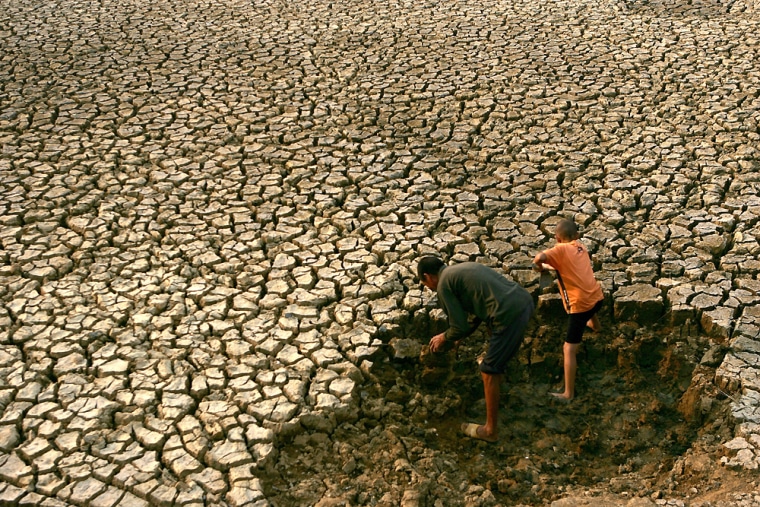A U.S. intelligence report coming out Thursday — and likely to grab President-elect Barack Obama's attention — is adding a new variable to the "traditional" mix of factors expected to destabilize the world into the near future.
Issued by the National Intelligence Council, the "Global Trends 2025" report includes warnings tied to climate change, the man behind the report said this week and in recent speeches.
The overall theme of the report is that the United States will have less influence across the globe at a time of growing climate, water and energy stresses, Thomas Fingar, chairman of the NIC and deputy director of national intelligence, indicated in recent weeks.
Within two decades, the report predicts, already sensitive areas from northern China to sub-Saharan Africa will have to deal with more droughts, food shortages and scarcity of fresh water.
At a briefing Tuesday ahead of the report's release, Fingar stressed that limited water and agricultural land could "add a kind of competition to the international system that we haven't seen for a very long time."
Water "will have to be on the agenda" of political leaders, he added.
The fourth of its kind since 1997, the report is meant to help U.S. administrations think strategically and long-term about potential future trends and how they should be dealt with. Obama on Tuesday pledged to act quickly and with international partners to curb emissions tied to global warming as soon as he takes office on Jan. 21.
Warning about Mideast water
Fingar, who's leaving the NIC on Dec. 1 after three years, spent nearly 20 years at the State Department's Bureau of Intelligence and Research, which famously dissented from the 2002 national intelligence estimate conclusion that Iraq was reconstituting its nuclear program.
More recently, he's been sprinkling the climate message around in speeches.
Earlier this month, he told a conference on Middle Eastern issues that parts of that region are "among the most vulnerable to water shortages" caused by warming temperatures that spread drought.
"If water is a problem today," he added, "it'll be a bigger problem in the locations that are a problem today by 2025."
In a September speech, he said that based on what climate scientists are saying there's nothing the world can do to avoid some changes already in motion.
"T he changes in sea level, the changes in temperature, the impact on agriculture, the impact on water availability, the impact that comes from melting in the Arctic and opening up resources and extending growing seasons in some places, and shortening them in others. That is going to happen," he said. "All we can begin to do now is prepare to mitigate those impacts."
Even the United States is vulnerable, he noted, citing predictions of a new "Dust Bowl" in the Southwest and more severe storms along the Atlantic seaboard and Gulf Coast.
U.S. military, nuclear sites at risk
"Practical problems" from more severe weather includes "63 military installations that are in danger of being flooded by storm surges," he added. "The number of nuclear power plants that are so similarly vulnerable is almost as high."
But his biggest concern is what climate-tied water and food shortages might do to weaker nations.
"Climate change, we concluded, is not by itself going to bring down any governments. It is not going to lead to wars," he added. But in the case of " already stressed and strained and failing and flailing governments and states ... this well could be the straw that breaks the camel’s back."
"Think about the difficulty of scrounging up in the international system the food for 17 or 18 million North Koreans, for a few tens of millions on the Horn of Africa," he said.
Last June, Fingar told Congress that "sub-Saharan Africa will continue to be the most vulnerable to climate change because of multiple environmental, economic, political and social stresses." In many African nations, climate stresses are "a main contributor to instability," he added.
In his September speech, Fingar said that even prosperous China has "severe water problems now a nd they get much, much worse by 2015 or 2020."
One example he cited: A farming region in China's north that produces food for 400 million " is running out of water because they are depleting the underground aquifers through millions of tube wells drilled in the 1960s."
"Any activity put down in the Chinese context, you have got one hell of a problem," he added. "And that is going to happen. This isn’t in the maybe category. This is in the for-real category."
